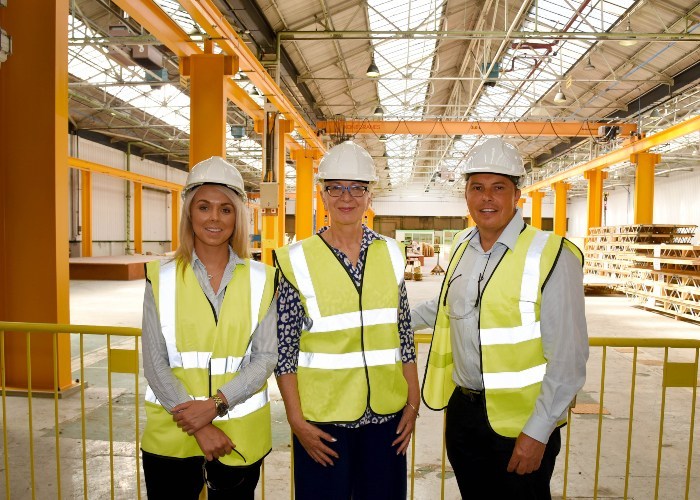An innovative building product developed by Wales largest specialist timber frame manufacturer based in Neath, has been given the green light to be used in six-storey buildings – an important landmark as it widens the potential market for its use.
The Triso-Warm structurally insulated panel modular build system, developed by Sevenoaks Modular, has been given the seal of approval by the BBA, the UK’s leading construction certification body.
The Triso-Warm system is at the forefront of innovative and creative solutions within the construction industry. It allows developers to boost efficiency, sustainability and cost-effectiveness across a diverse range of construction projects.
The certificate awarded by the BBA allows the company to construct six-storey buildings using the Triso-Warm product. Until recently, they could only use it up to four-stories. The certificate was granted after the company has demonstrated the product’s efficiency, sustainability and cost-effectiveness, as well as passing several tests conducted by the BBA to ensure its competence, durability and safety on higher storey builds.
Sevenoaks Modular’s Triso-Warm product comprises specially engineered timber frame panels injected with PUR highly insulated foam, which expands and adheres to the inner panel, creating an airtight seal. The product is extremely thermally efficient, addressing three key issues required for excellence in thermal efficiency: very low u-values – typically 0.11 W/m2K; good performance to resist cold bridging – y-values typically of 0.04 W/m2K; and good air permeability – as low as 1 m3/m2h @50pa. The product provides economic solutions to achieve an ‘A’ rated Energy Performance Certificate and higher levels of the Code for Sustainable Homes.
With the product’s excellent thermal efficiency, social housing developments such as West and Wales Housing Association, are using Sevenoaks Modular to install its Triso-Warm insulated panel modular build system to build new housing developments. 2018 reports from the Welsh Government showed 155,000 households in Wales were living in fuel poverty – equivalent to 12% of households. However, the percentage of households in fuel poverty has shown a decrease from 26% in 2008, with indications showing that this is a result of reduced household energy requirements due to energy efficiency improvements outweighing increases in fuel prices.
Sevenoaks Modular is due to complete a £10 million housing development in Pentland Close, Llanishen, Cardiff – where the Triso-Warm system is being implemented to meet the requirements of Wales and West Housing Association to ensure thermal efficiency is met for its future residents. The extensive project involves the build of five three-storey blocks – with large parts of the build -including installed doors and windows along with external cladding – being manufactured off-site, allowing for a speedy on-site installation. This is extremely advantageous to housing associations as on-site disruption is reduced and the assembly of the build is much quicker.
Charlotte Hale, director of Sevenoaks Modular, comments:
“This is an exciting time for Sevenoaks Modular as we are offering a product that is much sought after in the current climate of fuel poverty in Wales – and we are happy to be able to provide a solution to help people stay warm, without it costing money that some households are unable to afford.
“We have had great feedback from the social housing developments and other clients that have used Sevenoaks Modular to install our Triso-Warm insulated panel modular build system. We are thrilled to have been awarded the next level certificate by the BBA to enable us to now use the product on six-storey builds.”
Claire Curtis-Thomas, CEO of the BBA, said:
“As a company it pleases us to see how JG Hale has used their BBA Certified Triso-Warm product to provide a long lasting and effective solution to the construction of offsite housing in Wales. The innovation and development displayed by JG Hale and Sevenoaks Modular in the continual expansion of their business footprint can only bring about positive changes for the industry and the City of Wales.”
Sevenoaks Modular has recently announced it aims to invest some £6.5 million in acquiring and regenerating a large part of an iconic industrial site in Neath. Known locally as the Metal Box factory, renovations of the site are already underway and has been renamed to the JCG Buildings.
The company, which currently employs around 100 people in Neath, anticipates it will double its workforce in the next 12 months in conjunction with its expansion to the 300,000sqft site. Sevenoaks Modular has been growing rapidly since it was formed in June 2018 on the back of a growing demand for modular construction solutions in the UK. This move should allow it to go from producing 1,000 homes per year to more than 3,000 per year.
